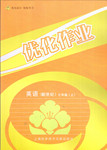B
You're in a bit of a dilemma standing in front of the produce section of your local supermarket. In one hand, you're holding a conventionally grown Granny Smith apple.In your other hand, you have one that's been organically grown. Both apples are firm,shiny and green. Both provide vitamins and fiber, and both are free of fat, sodium and cholesterol.
The conventionally grown apple costs less and is a proven family favorite. But the organic apple has a label that says "USDA Organic". Does that mean it's better? Safer? More nutritious? Several differences between organic and non-organic foods exist. Become a better informed consumer for your next trip to the supermarket.
The word "organic" refers to the way farmers grow and process agricultural products, such as fruits, vegetables, grains, dairy products and meat. Organic farming practices are designed to encourage soil and water conservation and reduce pollution.Farmers who grow organic produce and meat don't use conventional methods to fertilize, control weeds or prevent livestock disease.
Here are other differences between conventional fanning and organic farming:

* Organic or not? Check the label.
The U.S. Department of Agriculture (USDA) has established an organic certification program that requires all organic foods to meet strict government standards. These standards regulate how such foods are grown, handled and processed.Any farmer or food manufacturer who labels and sells a product as organic must be USDA certified as meeting these standards. Only producers who sell less than $5,000 a year in organic foods are exempt (免除) from this certification.
If a food bears a USDA Organic label, it means it's produced and processed according to the USDA standards. The seal is voluntary, but many organic producers
use it.
46. The main purpose of the passage is_________.
A. to promote the sales of organic food
B. to inform people organic food is better for their health
C. to persuade people to become informed consumers
D. to compare conventional and organic foods
47. According to the passage, organic farming is intended to_________.
A. improve the quality of the soil and water
B. take the place of the traditional agriculture entirely
C. adopt eco-friendly methods to grow plants and feed animals
D. prevent livestock from getting disease more effectively
48. According to the passage, the conventionally grown apple_________.
A. costs less but tastes worse than an organic one
B. doesn't look the same as an organic one
C. has proven itself acceptable by the family
D. contains more fat, sodium and cholesterol
49. Which of the following methods belongs to organic farming?
A. Using chemicals to kill insects and prevent disease.
B. Using rotted plants as fertilizer to promote plant growth.
C. Using growth hormones to speed up animals' growth.
D. Using pests to reduce insects and disease.
50. From the passage we know the organic certification program________.
A. is not meant for all producers of produce
B. makes it compulsory to attach a USDA Organic label
C. sets restrictions on the sales of organic produce
D. requires all foods to satisfy the strict government standards

 培优三好生系列答案
培优三好生系列答案 优化作业上海科技文献出版社系列答案
优化作业上海科技文献出版社系列答案